
Did you know that 70-90% of couples who attend therapy see improvements in their relationship? Whether it’s communication issues, trust problems, or feeling apart, therapy can help.
Therapy is a safe place for couples to improve their communication and deepen their connection. It helps them face life’s challenges together. By learning to express their needs and manage conflicts, couples can better understand each other.
Going to couples counseling can change your relationship for the better. It teaches partners how to handle life’s ups and downs together. Focusing on your relationship’s health and getting help from a therapist can deepen your connection and become more resilient. Whether you’re dealing with a specific problem or just want to strengthen your bond, therapy is a powerful tool.
Are you dealing with communication problems, trust issues, or feeling emotionally distant? Seeking couples therapy is a brave step for your relationship’s future. With the right help, you can find love, trust, and connection again. This blog post is a guide for couples at a crossroads. It helps readers know when therapy is needed and the benefits it brings.
Key Takeaways
- Couples who seek therapy tend to have higher levels of relationship satisfaction.
- Couples therapy provides a safe space to develop communication skills, deepen intimacy, and face challenges together.
- Trust plays a significant role in relationships, and couples therapy can help rebuild trust and foster empathy.
- Techniques like the Gottman Method and Strength-Based Couples Counseling are tailored to the unique needs of each couple.
- Engaging in couples counseling can equip partners with the skills and insights needed to build a stronger, more resilient relationship.
Why Do Relationships Struggle?
Discover the common challenges couples face and how to overcome them with the right support.
Top Couples Therapist: Where 99% Of Relationship PROBLEMS Come From
Relationships take a lot of work to navigate. Love is the base, but keeping a relationship healthy needs skills many couples don’t have. Trust issues, emotional intimacy challenges, and relationship stressors can make partners feel apart and unhappy.
Studies show many women feel they lack real intimacy, even when their partners think they do. This gap comes from a shift in dating culture. Now, casual meets and physical pleasure often take over the search for deep emotional bonds.
Dating apps and social media make it hard to truly know someone. Couples might struggle with signs of relationship problems like bad communication, constant fights, and losing common interests. These problems can damage trust and make partners feel far apart, even when they try hard to stay together.
Seeing the need for help is key to rebuilding trust in relationships and building a closer bond. Couples therapy offers a safe space to learn how to talk better, solve conflicts, and understand each other’s needs. Couples also learn empathy tools that help build emotional intimacy. With a therapist’s help, couples can tackle today’s relationship challenges and find the emotional closeness they seek.
What Is Couples Therapy and How Can It Help?
Learn how couples therapy works to strengthen bonds, improve communication, and build lasting relationships.
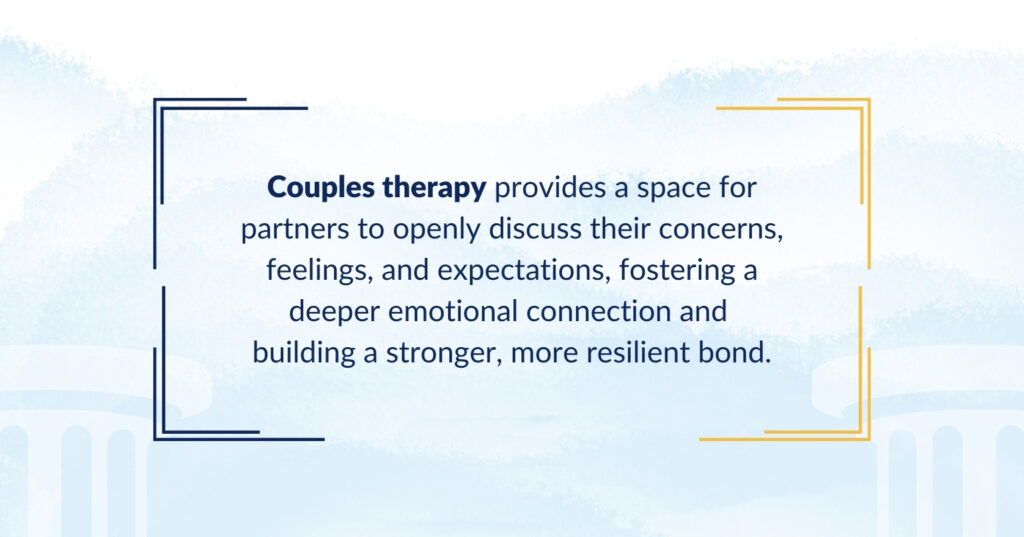
Couples therapy, or marriage or relationship counseling, helps partners deal with relationship challenges. It focuses on improving communication in relationships, finding ways to manage conflicts, and building a stronger emotional bond.
Therapy helps couples understand the reasons behind their conflicts, such as poor communication, trust issues, or past traumas. Through therapy, partners openly discuss their concerns, feelings, and expectations, fostering a deeper emotional connection and building a stronger, more resilient bond.
Couples therapy does more than just fix immediate problems. It also teaches couples how to succeed in the long run. They learn how to communicate better and manage conflicts in a healthy way. This helps prevent misunderstandings and keeps the relationship strong.
Couples counseling has a success rate of about 70-75%. It’s a proven way to make relationships better and last longer. By choosing therapy, couples show they’re committed to a healthy, loving relationship based on open communication and mutual respect. They learn to communicate better, trust more, and feel secure. Therapy also helps them manage stress and prepare for future challenges.
Is Couples Therapy The Right Path?
Explore answers to the most common concerns about therapy, from its benefits to what to expect in sessions.
Thinking about couples therapy can raise many questions. Couples often wonder if their relationship is worth saving. They might question if therapy is the right choice and what to expect from sessions.
These doubts are not uncommon, but seeking counseling can be a big step towards a stronger relationship. It helps in growing together and supporting each other emotionally.
Is this relationship worth saving?
Deciding if a relationship is worth saving is a personal choice. If both partners are ready to work on it, therapy can help. It offers a safe place to talk about issues, improve communication, and find ways to strengthen the bond.
Is couples therapy the right choice?
Couples therapy is good for any stage of a relationship, from dating to marriage. It’s not just for troubled relationships but also for keeping a bond strong. Individual therapy can also help, focusing on personal growth and self-awareness.
The choice to try couples therapy depends on what each partner needs and wants.
What can be expected from therapy?
In therapy, a trained therapist helps both partners tackle challenges, improve communication, and understand each other better to build a stronger connection.
They can learn how to resolve conflicts and grow closer emotionally. Therapy offers insights into their relationship and teaches valuable skills.
Therapy is a healthy way to face life’s ups and downs together. By getting counseling, couples can make their relationship stronger. They can build a more resilient and fulfilling partnership.
When Is It Time to Seek Outside Help for Your Relationship?
Identify the key signs that indicate couples therapy could help you strengthen your bond and resolve conflicts.

Relationships have ups and downs, and knowing when to seek help can be tough. Couples therapy is a great way to overcome relationship hurdles and reconnect. But, it’s important to recognize when you need it. On average, couples wait six years before seeing a therapist, says relationship expert John Gottman.
Frequent and intense arguments are a big sign you might need therapy. Constant fights can make a relationship feel shaky. Improving your relationship often means changing how you talk to each other. This includes avoiding stonewalling, criticism, or defensiveness, which can make one partner feel bad.
Communication Breakdowns and Conflict
When couples don’t communicate well, it’s a sign they might need therapy. Not being able to share thoughts and feelings can lead to resentment. Learning about couples therapy can teach you how to talk better, making your connection stronger.
Differences Between Indifference and Excessive Negativity
Being indifferent or too negative can harm a relationship. Feeling ignored or always being criticized can hurt. Therapy can help you change these patterns, making your communication better.
Managing life changes is another reason for couples therapy. Big changes, like career changes or having a baby, can stress a relationship. Therapy offers a safe place to deal with these changes together, helping you grow closer.
Healing the Past, Strengthening the Future
Discover how therapy provides a safe space to confront unresolved issues and rebuild trust and connection.
Couples often carry past wounds and traumas into their relationships. These can block emotional closeness and trust. Unresolved conflicts and emotional baggage can lead to endless arguments and a growing gap between partners. Therapy offers a safe space to tackle these issues and start healing.
In therapy, partners share their thoughts, feelings, and actions openly. This openness builds trust and strengthens their bond.
Creating a Safe Space for Healing
Therapists aim to create a safe, supportive environment for couples to explore past hurts. This involves setting clear boundaries and working to resolve conflicts. By tackling these issues, couples can move past negative patterns and build a stronger relationship.
“Vulnerability is the birthplace of love, belonging, joy, courage, empathy, and creativity. It is the source of hope, empathy, accountability, and authenticity.” – Brené Brown
Gottman Method, Strength-Based Couples Counseling, and Cognitive Behavioral Therapy are approaches in couples therapy. Each aims to help partners feel safe to share emotions. This shift leads to a deeper understanding and empathy, key for relationship improvement strategies.
By facing past hurts and improving communication, couples can solve problems together. Reconnecting in a relationship means being open, transparent, and committed to healing. With a skilled therapist’s help, couples can overcome past wounds and build a more loving partnership.
Rediscovering Connection in a Growing Relationship
Understand the signs of emotional distance and how therapy can help couples reconnect and rebuild their bond.
It’s common for couples to feel like they’re growing apart as their relationship grows. This can show up as less talking, losing common interests, and feeling disconnected. If these issues aren’t fixed, they can cause bigger problems and even threaten the relationship.
Several things can make couples feel like they’re drifting apart, including:
- Raising children and caring for elderly parents
- Focusing on career growth
- Unresolved emotional wounds
- Daily stress and pressures
When couples don’t make time to keep their bond strong, they might start to feel like they’re not connected anymore. Marriage counseling can help them reconnect by finding common ground again. It’s a safe place to talk about what’s causing the distance.
Signs of Emotional Distancing
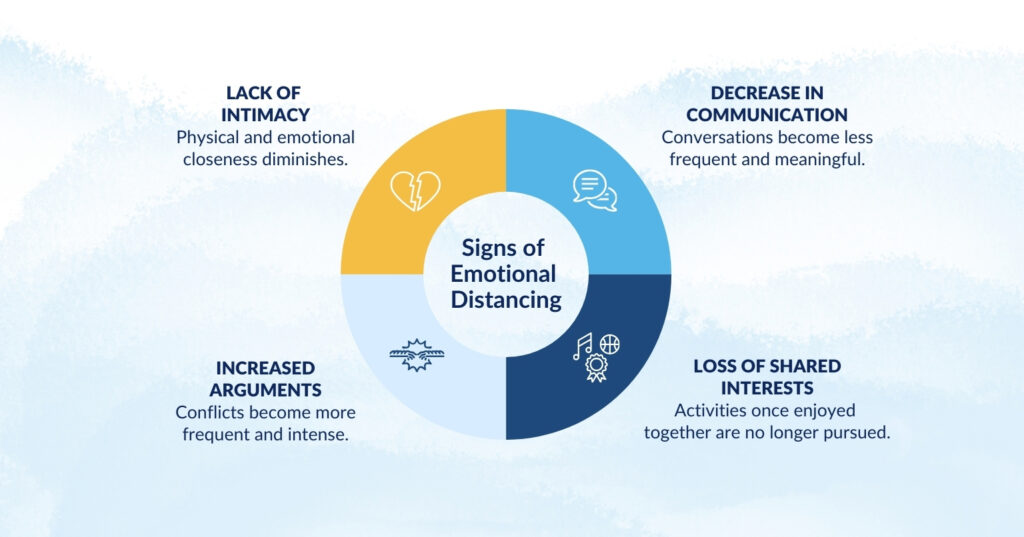
It’s important to know when emotional distance is growing. Some signs include:
- Decreased Communication: Talking less or less meaningful
- Loss of Shared Interests: Not doing things they used to enjoy together
- Increased Arguments: More or bigger fights
- Lack of Intimacy: Less physical and emotional closeness
Couples can avoid growing apart by choosing to grow together. They should make time and effort to keep their relationship strong.
Improved Communication Skills
Improving communication skills is a key goal of couples therapy. It involves active listening, clear expression of needs, and constructive conflict resolution. Therapists help couples understand each other better and find common ground and using communication skills:
- Active Listening: Fosters empathy and understanding.
- Express Needs Clearly: Prevents misunderstandings and resentment.
- Managing Conflict Constructively: Reduces escalation and promotes problem-solving.
Good communication leads to deeper intimacy and understanding. It helps couples resolve conflicts and make decisions together. This is crucial for a strong emotional connection in a relationship.
Couples often report increased intimacy, better communication, and a deeper understanding of each other following couples therapy.
How Therapy Helps Partners Reconnect
Couples therapy helps partners reconnect deeply. It teaches them to talk better, share their needs, and solve problems together. It also helps with trust issues in relationships, healing past hurts and rebuilding closeness.
With a good therapist, couples can celebrate their strengths and work on getting better. Simple actions like being gentle, starting meaningful talks, and learning new things about each other can bring them closer together.
Rebuilding Trust and Emotional Intimacy
Explore how couples therapy helps repair broken trust and restore physical and emotional intimacy.
Emotional intimacy is key to a strong, healthy relationship. It leads to higher satisfaction, better communication, and less conflict. Yet, many couples struggle to keep this connection alive, feeling lonely and disconnected.
“Emotionally intimate partners are more likely to feel ‘in sync’ with each other, align their goals, and work together toward a shared future, contributing to longer, healthier lives.” – Holt-Lunstad et al., 2010
Couples therapy helps rebuild trust and empathy. It creates a safe space for openness and understanding. Studies show that honest communication leads to deeper emotional connections and satisfaction.
Improving Trust for Emotional Closeness
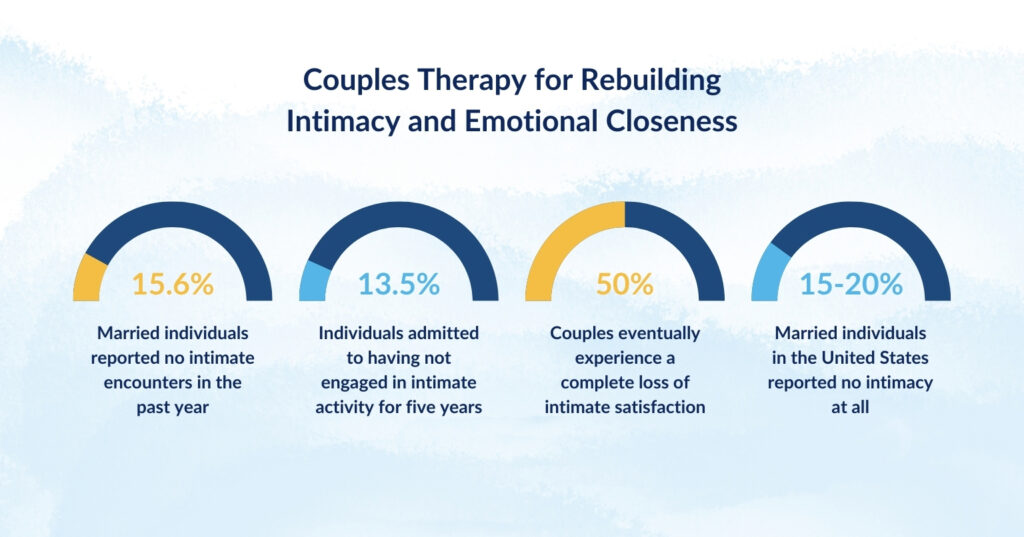
Trust is key in any relationship. When trust is broken, satisfaction drops and separation becomes more likely. Therapy offers a chance to rebuild trust and work through past hurts. Techniques like Strength-Based Couples Counseling and the Gottman Method help couples communicate better, resolve conflicts, and find shared meaning.
Lying, cheating, or keeping secrets can make partners feel insecure and doubt themselves. This leads to poor communication and makes it hard to talk openly. Studies show the following key intimacy situations for couples:
- 15.6% of married individuals reported no intimate encounters in the past year.
- 13.5% of individuals admitted to having not engaged in intimate activity for five years.
- 50% of couples eventually experience a complete loss of intimate satisfaction.
- 15-20% of married individuals in the United States reported no intimacy at all.
Trust issues can make partners feel like they’re living with a stranger. This feeling of being alone can make them feel lonely and lead to more fights. Doubts about the relationship’s future can grow.
“If you can accommodate each other’s “crazy” side and handle it with caring, affection, and respect, your marriage can thrive. Trust is built in very small moments. In any interaction, there is a possibility of connecting with your partner or turning away from your partner.” – John Gottman
Trust is the foundation of any strong relationship, and when it’s broken, it takes time, effort, and commitment to rebuild. Couples therapy offers a safe place to work on trust issues. Therapists teach couples how to communicate better and be honest. This helps partners rebuild trust by sharing openly.
The Power of Accountability in Relationships
Therapists stress the need for accountability. They encourage partners to own up to their mistakes and make things right. Therapy provides tools and support to tackle trust issues together.
Infidelity can bring up many feelings, like sadness and insecurity. Therapy helps partners deal with these feelings in a caring way. It teaches constructive communication techniques to strengthen their bond.
Counseling helps partners learn about themselves and their values. This self-discovery is key to building a stronger sense of self during tough times.
Finding a couples therapist who knows about trust and intimacy is important. Therapy helps partners heal emotionally and relationally. It teaches them to communicate better and understand each other’s needs.
The Power of Presence and Affection
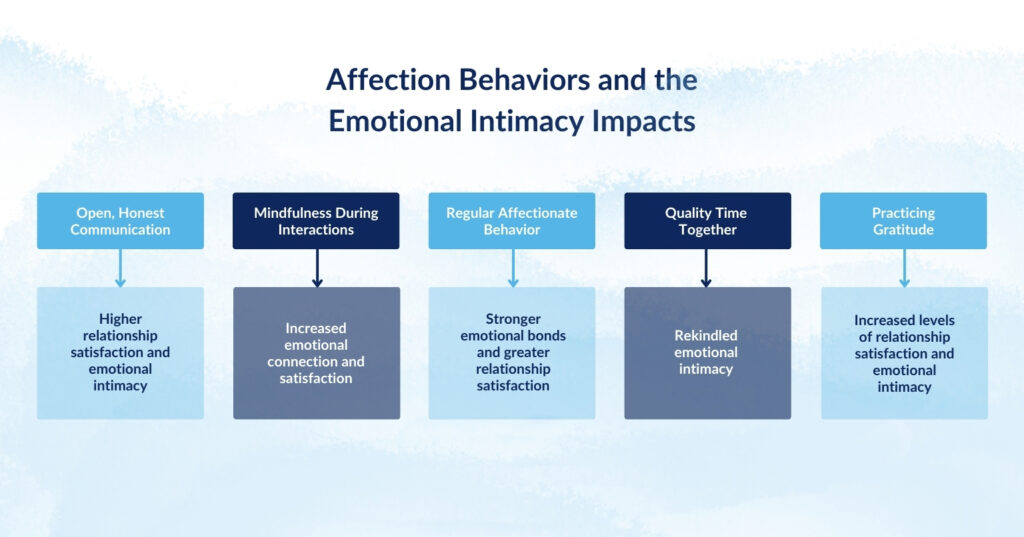
Mindfulness strengthens emotional bonds. Being fully present in interactions boosts connection and satisfaction. Regular affection, like holding hands or sharing a kiss, also sparks intimacy.
Quality time and shared activities can rekindle emotional intimacy. Couples who prioritize these moments often find their bond strengthened. The following behaviors help to impact on emotional intimacy positively:
- Open, Honest Communication: Higher relationship satisfaction and emotional intimacy.
- Mindfulness During Interactions: Increased emotional connection and satisfaction.
- Regular Affectionate Behavior: Stronger emotional bonds and greater relationship satisfaction.
- Quality Time Together: Rekindled emotional intimacy.
- Practicing Gratitude: Increased levels of relationship satisfaction and emotional intimacy.
Recent studies show that individual therapy for relationship issues and counseling for emotional support boost emotional intimacy. This is especially true for couples with long-standing communication problems. Therapy helps partners express their true selves, essential for emotional connection.
Strengthen Your Bond Through Conflict Resolution
Explore strategies to uncover root causes, resolve disputes, and rebuild trust with proven therapy techniques.
Couples therapy is key in teaching couples how to manage disagreements. It helps them understand each other better and find common ground. This strengthens their bond.
Many couples face the same conflicts over and over. But, learning to communicate better and resolve issues can change this. Spending quality time together helps couples solve problems more easily.
Listening well and staying calm during arguments helps solve problems. The Gottman Method is a well-known approach in therapy. It focuses on building trust and intimacy, teaching couples to resolve conflicts in a healthy way.
Uncovering the Root Causes of Conflict
Couples therapy helps find the real reasons behind conflicts. Studies show 78% of couples gain a deeper understanding of these issues. Therapy addresses past traumas and promotes self-awareness, helping couples tackle the core problems.
Improving Communication and Emotional Expression
Good communication is crucial for resolving conflicts. Counseling helps 85% of couples improve their communication. The key foundation to good communication is understanding a partner’s perspective, whether you agree or not. Active listening and expressing feelings constructively are key skills learned in therapy.
Managing emotions is also important. Counseling helps couples reduce emotional reactions, leading to fewer conflicts. Learning to avoid communication pitfalls and being aware of nonverbal cues also helps.
Developing strategies for conflict resolution in therapy leads to better outcomes. Couples learn to empathize and rebuild trust and intimacy. This results in a more fulfilling relationship.
Through therapy, couples gain the tools to handle disagreements better. This leads to a more harmonious and fulfilling partnership.
Breaking the Cycle of Repeated Conflicts
Learn how to address perpetual problems and develop conflict management skills to strengthen your relationship.
When couples keep arguing about the same things, it might mean they have big problems. Drs. John and Julie Gottman found that 69% of relationship conflicts are ongoing. These issues get harder to solve after many failed tries.
It’s important to know if a problem can be solved or not. Solvable problems need open communication and compromise. But, perpetual problems are about deep differences, like values or goals. Trying to change someone’s core self is not healthy.
Couples therapy can help with ongoing conflicts. It offers a safe place to discuss disagreements. Couples learn to communicate better through proven problem-solving techniques that allow them to solve conflicts together instead of against each other. Working together leads to more trust and closeness in the relationship.
Learning to manage conflicts is key. In therapy, couples can develop skills like respectful discussion and active listening. This helps them deal with perpetual problems better.
Developing Conflict Management Skills
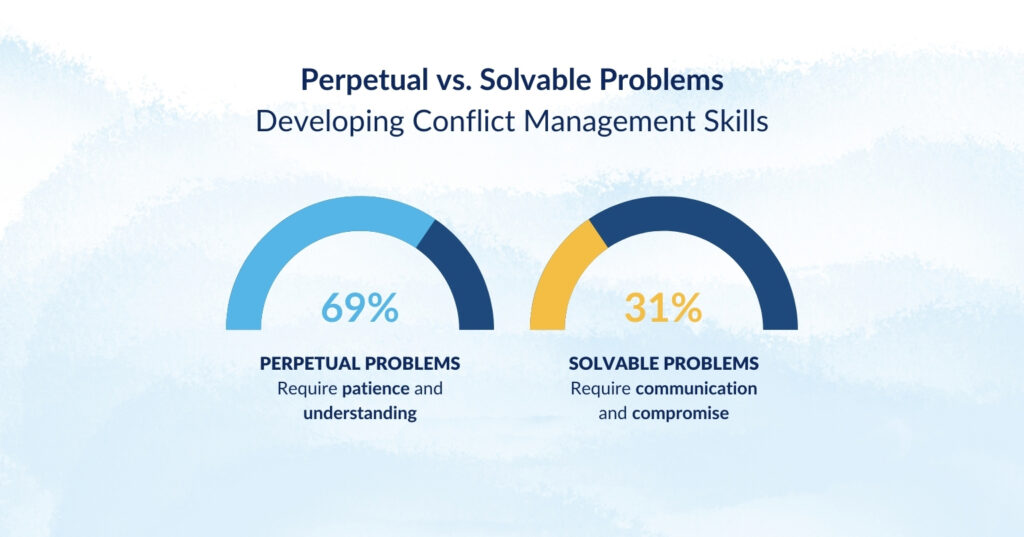
In therapy, couples learn important skills for managing conflicts. These include:
- Approaching issues softly and respectfully
- Accepting each other’s influence and perspectives
- Using repair strategies to de-escalate tense situations
- Applying soothing tools to manage emotional reactions
- Compromising healthily without sacrificing core needs
Working through past issues can make talking about ongoing problems easier. This increases empathy and strengthens the bond between partners, even with unresolvable differences.
Knowing the difference between solvable and perpetual problems is key:
- Perpetual Problems: Makes up 69% of relationship issues. Resolving these problems requires patience and understanding.
- Solvable Problems: Makes up 31% of relationship issues. Resolving these problems requires communication and compromise.
With a therapist’s help, couples can overcome repetitive arguments and relationship stressors. Therapy provides tools for a stronger, more resilient partnership, even with life’s challenges.
Growing Together by Growing Individually
Learn how self-reflection and understanding personal patterns help build a stronger relationship.
Couples therapy does more than just help with communication and conflict. It also focuses on growing as individuals. Understanding your own emotions and behaviors helps build stronger relationships and personal growth.
Doing self-reflection exercises in therapy can make relationships 80% happier. By looking into their own thoughts and feelings, partners learn more about themselves. This self-awareness helps them understand their own triggers and strengths, leading to empathy and understanding in the relationship.
Understanding Personal Patterns and Behaviors
Couples therapy is a safe place to explore attachment styles from childhood. Knowing your attachment style helps you understand your emotional responses. This knowledge helps in improving communication and conflict resolution.
Strengthening Relationships Through Individual Growth
Working on personal growth helps the relationship, too. Self-reflection builds trust and respect. It helps partners approach their relationship with clarity and empathy.
Combining couples therapy with individual sessions is a great way to heal and grow. Couples therapy works on relationship issues, while individual therapy focuses on personal growth. This approach helps individuals grow while strengthening their partnership.
When choosing therapy, think about what you need to work on. A good couples therapist will focus on individual growth, too. Couples can build a strong and lasting relationship by focusing on self-awareness and personal development.
Facing Life’s Challenges Together
Learn how couples therapy can help navigate major life transitions and external stressors, building resilience and connection.
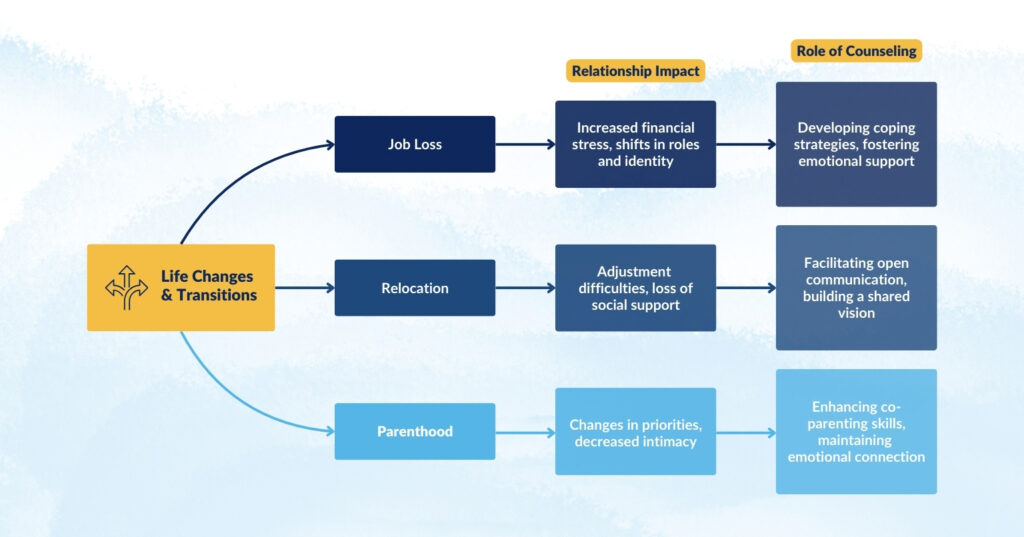
Life changes, like losing a job, moving, or having kids, bring mixed feelings. You might feel anxious, excited, sad, or confused. These life transitions can strain your relationship, testing how strong you are together:
- Job Loss: Increased financial stress, shifts in roles and identity
- Relocation: Adjustment difficulties, loss of social support
- Parenthood: Changes in priorities, decreased intimacy
Couples may struggle to adjust to new roles and responsibilities. This can lead to more fights and less talking to each other.
Stress from the outside can make relationship problems worse. Money issues are a big source of fights. Couples might disagree on spending, job loss, or how to manage money.
Parenting can also cause disagreements. You might argue about how to raise your kids, who does what, and how to spend time and money.
Getting relationship counseling or marriage therapy can help. Therapy offers a safe place for you to work through tough times together. It helps you to communicate better, share household tasks, and deal with intimacy issues caused by stress:
- Develop coping strategies to foster emotional support
- Facilitate open communication to build a shared vision
- Enhance co-parenting skills to maintain an emotional connection
Working together, couples can avoid letting stress tear them apart. Relationship therapy teaches you to be resilient and adaptable. It helps you see changes as chances to grow and learn together. With a therapist’s help, you can overcome challenges and strengthen your relationship.
Understanding how to navigate external factors like work, extended family, career changes, and moving homes is essential for maintaining a healthy marriage.
Choosing the Best Path for Your Relationship
Learn about leading approaches like the Gottman Method, Cognitive Behavioral Therapy, and more to find the right fit for your relationship.
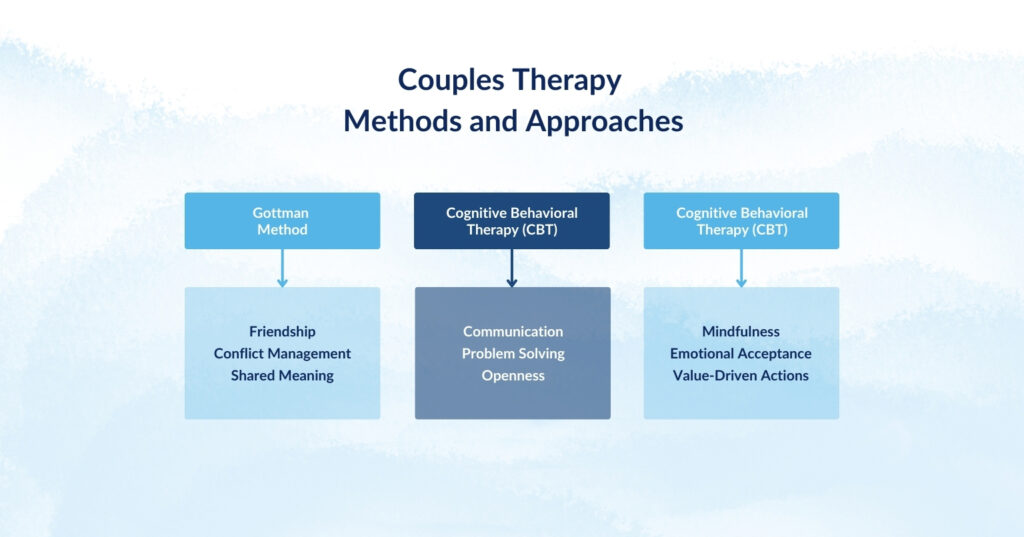
When overcoming relationship hurdles, picking the right therapy and therapist is key. Couples therapy and marriage counseling use different methods to tackle challenges and strengthen the bond. This helps partners work through issues together.
Each method focuses on different parts of the relationship. This helps couples face challenges and grow closer. Let’s dive into some top couples therapy approaches.
- The Gottman Method, created by Drs. John and Julie Gottman, works on three main areas. It aims to build stronger friendships, manage conflicts better, and share goals. This method has shown great success, with studies saying it can predict divorce with 94% accuracy.
- Cognitive Behavioral Therapy (CBT) for couples helps solve problems and improve communication. It teaches partners to change negative thought patterns. This therapy aims to make relationships better and more open.
- Acceptance and Commitment Therapy (ACT) emphasizes embracing emotions and developing mindfulness skills. This approach helps couples accept difficult feelings while committing to actions that align with shared values, fostering growth and emotional connection.
Other notable methods include Schema Therapy, Acceptance and Commitment Therapy, and Solution-Focused Therapy. Each has its own focus and benefits.
The goal of couples therapy is not to solve every problem but to help couples develop the skills and understanding needed to navigate challenges together. By looking into these different couples therapy approaches, partners can find what works best for them. This can lead to a stronger and more fulfilling relationship.
Finding the Right Couples Therapist

Finding the right therapist for couples therapy is key. Look for someone experienced and qualified who fits your needs. Start by searching for therapists who focus on couples and have helped others reconnect. Think about their approach, how they handle different cultures, and their fees. Websites like The American Counseling Association and Psychology Today can help you find therapists based on these criteria.
After finding potential therapists, set up initial meetings to see if they’re right for you. Ask about their experience with couples, their understanding of relationships, and how they run therapy sessions. Make sure they create a safe space where you can talk openly and honestly.
Tailoring Therapy to Your Needs
A good therapist will tailor their methods to your unique situation. They might use techniques like Strength-Based Couples Counseling or the Gottman Method. These help you communicate better, solve conflicts, and grow closer emotionally. Your therapist will keep checking in to make sure you’re getting better and adjust their approach as needed.
Investing in Your Relationship’s Future
Choosing to go to couples therapy is a big step towards a better relationship. By picking a therapist who understands you, you and your partner can learn to face challenges together. This investment in your relationship can lead to more happiness and a better life for both of you.
Couples Therapy FAQs: What You Need to Know
Get answers to common questions about couples therapy, its benefits, and how it can transform your relationship.
1. What are some common signs that a couple may need therapy?
Signs a couple might need therapy include constant and intense fights. They might also struggle with communication, feel emotionally distant, or lose trust. Difficulty handling life changes or stress is another sign.
2. How can couples therapy improve communication skills?
Therapy offers a place to learn how to talk better. You’ll learn to listen actively, share your needs clearly, and handle disagreements well. Therapists help you break bad communication habits and find better ways to talk.
3. What are the benefits of couples therapy for resolving conflicts?
Therapy teaches you how to disagree in a healthy way. You’ll learn to understand each other better, find common ground, and avoid blaming. It helps rebuild trust, empathy, and intimacy.
4. Can couples therapy help with rebuilding trust after infidelity or other breaches?
Yes, therapy is a safe space to work on healing and rebuilding trust. It’s a tough road, but therapy gives you the tools and support you need.
5. How does individual growth in therapy contribute to a stronger relationship?
Therapy helps you understand yourself better, which builds empathy and self-awareness. This growth strengthens your relationship as you become more connected and resilient together.
6. What are some different approaches to couples therapy?
Gottman Method, Strength-Based Therapy, CBT, and ACT are couples therapy approach options. Methods and approaches are personalized and designed to meet your relationship’s unique needs.
7. How can a couple find the right therapist for their needs?
Look for a therapist based on their experience, approach, and how they specialize. Consider their cultural sensitivity and if they fit your budget. Choose someone who makes you feel safe and understood, and tailors therapy to your needs.
Take the First Step Toward Healing and Connection
Reclaim your well-being with compassionate, personalized support from Pillars of Hope Counseling.
Every relationship and individual journey is unique, and challenges don’t have to be faced alone. At Pillars of Hope Counseling, Angelie Karabatsos brings years of experience and a compassionate approach to help you find clarity, healing, and connection. Whether you are navigating communication challenges, rebuilding trust, or overcoming infidelity, Angelie is here to guide you every step of the way.
Serving the Tigard, Lake Oswego, Hillsboro, Tualatin, Beaverton, and Portland areas, Angelie offers personalized therapy options designed to meet your unique needs. Through proven methods like CBT, ACT, and Strength-Based Therapy, you’ll gain tools to face life’s challenges with confidence and resilience.
Take the first step toward a healthier, more fulfilling life. Schedule a consultation today and discover how Pillars of Hope Counseling can empower you to overcome obstacles and create lasting change.